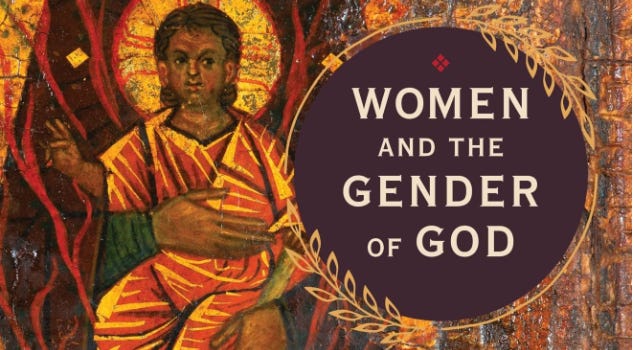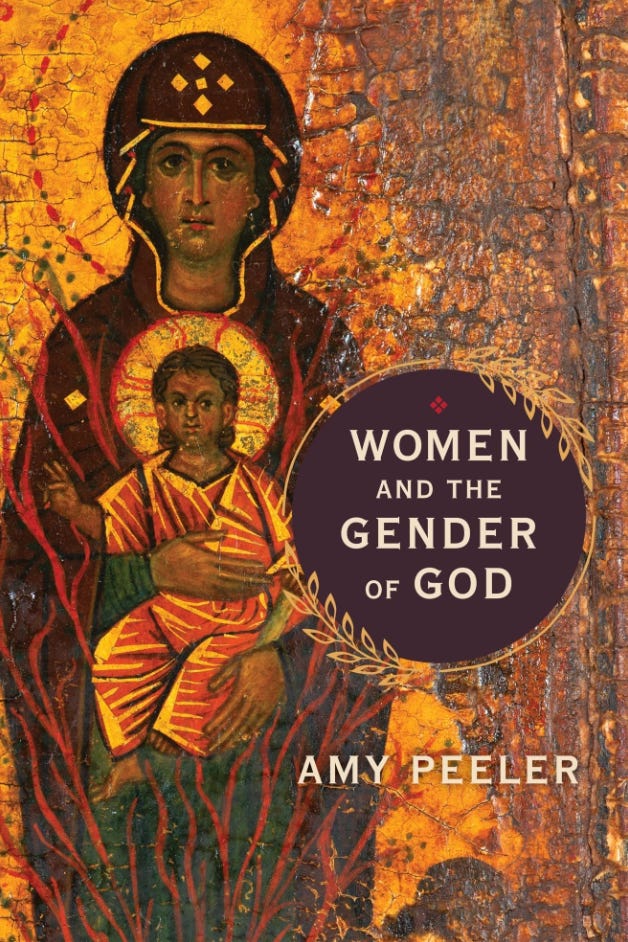In her new and important book, Amy Peeler Women and the Gender of God, examines the argument that if Jesus’s flesh, that is his DNA, derives only from a woman, can it be claimed that Jesus can save all – since he didn’t assume male flesh.
Problems are raised by the manhood/maleness of Jesus when it comes to redemption, and names like CS Lewis and Kathy Keller and Kallistos Ware and Thomas Hopko and Hans Urs von Balthasar figure in her setting up of the problem: they think God chose a man to represent God because only males can represent God. Thus, “Jesus and his representative, the male priest, reflect the way of God wholesale.” Or, “Jesus had to be male because it is a better reflection of God.” Which leads some of these thinkers from Jesus as male to God the Father as male. She presses down firmly with “When only men can stand in for God, then God indeed seems male.” I don’t believe she’s pressing too hard. There is a masculinist sense to such views of God.
Her argument is that Jesus’ maleness is not the same: he “became embodied like no other.”
A major section discusses the virginal conception and what it reveals about the Son and the Father and men and women. There is much discussion about the virginal conception, and much of it denying what has been traditionally affirmed. Peeler examines each view thoughtfully and carefully. Her section is a model of interaction.
First, it is argued that the virginal conception is not a theological necessity. Incarnation does not require virginal conception. She mentions Andrew Lincoln and Oliver Crisp.
Second, the discussion today is whether the virginal conception texts in Matthew and Luke could be read as a natural birth of some sort. Texts like “coming upon” need not mean virginal conception but could mean empowerment from God. But virginal conception, she rightly concludes, “is the clearest and best interpretation of the story.” One has to strain some texts to make it a natural conception. Like “I have no known a man” in Luke 1:34.
Third, the big one is if the texts in the Gospels are not the bricolage of Greco-Roman texts about supernatural conceptions and births of demigod-like figures in that history. So, it is myth-making or theological rather than what happened. The genre of the day – a bio of a major figure like Jesus – made possible the use of a Greco-Roman trope of a supernatural conception. The idea did not come from Judaism; nothing in that world prepares for what the Gospels affirm. The virginal conception, then, elaborates the high status of Jesus.
Amy Peeler is at her best here: this theory would diminish Jesus into the likeness of the Greco-Roman heroes and weaken the strong claims made about Jesus. It puts him in the “pantheon of gods.”
Also, it makes Jesus a demigod like other heroes while the Gospels want him to have no peer.
Third, it would make Jesus a human like other humans, no matter how great.
The Gospel writers knew that claiming this of Jesus would be denigrated. They affirm it because they think it’s too positive to be silenced.
Instead, they use a common trope to make a distinction from the others; they use a convention to “show that he is nonconventional.” He is not like the other gods.
But, does the incarnation of Jesus via virginal conception make Jesus so different he is not able, as a human/male to assume the flesh of the male?
Did Adam have a human father? Was he human, was he male?
Jesus, to be sure, is different but not so unlike other humans. A Y chromosome from God remains a flesh and blood human, a man.
Now this raises something observed at times in feminist scholarship: Can a “female-conceived [alone] Savior save men?” The female-conceived Jesus “does elevate women” in the incarnation and deserves careful attention on our part. He is conceived “only and through a woman.” But she quickly adds, “not to the detriment of men” (in italics).
Notice, then, this concluding line to this section: “a male-embodied Savior with female-provided flesh saves all.” Jesus’ unique conception and the uniqueness of incarnation “embraces male and female.”
The Christian theology of the incarnation, if at any moment and in this very special moment, elevates women as God chooses the form of the incarnation.






Fascinating, and this perspective on Jesus's DNA being derived only from a woman, and questioning whether he can save all since he didn't assume male flesh is exactly the kind of questioning and angle on the scriptures that opens up our imaginations in deeper ways. When women interpret the scriptures, do thorough exegesis and hermeneutics, and bring in a female perspectives to theology, we all benefit. God becomes bigger instead of smaller. I find it all so wonderful. Thanks for this synopsis of Amy Peeler's work on this. It's remarkable.
WOW!!! Yes, this post, and Amy’s writing is nothing less than a WOW!!! Otherwise, we might be like a resuscitated Lazarus, rather than a new creation. More food for further faithful imagination about “The Incarnation” and what more it might mean for us on many levels. A first look at a steamy slice of pizza, could make a cursory look determine that I’m not going to eat THAT!!! However, once the smell takes over, my mouth waters, and I take a bite - I’m blessed with a lifetime of great pizza enjoyment!!!
Mere pizza cannot fully capture the blessings of what Amy’s book can help us discover!
My Roman Catholic upbringing, Greek heritage, switch to United Methodism, and calling into pastoral ministry leave me no choice but to have a faith-imagination, and an eagerness to discover more every day.
Thank you!